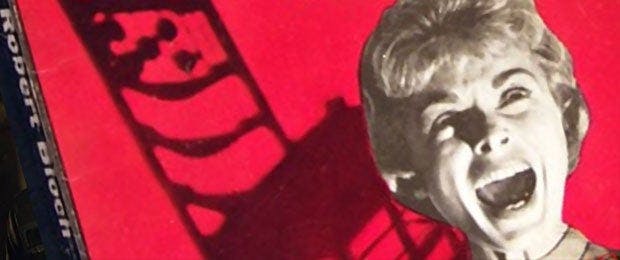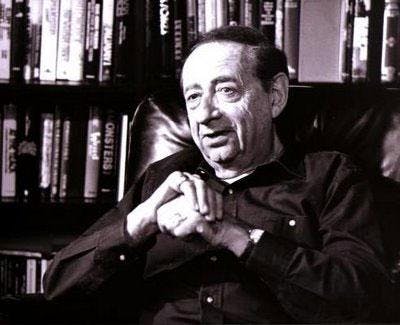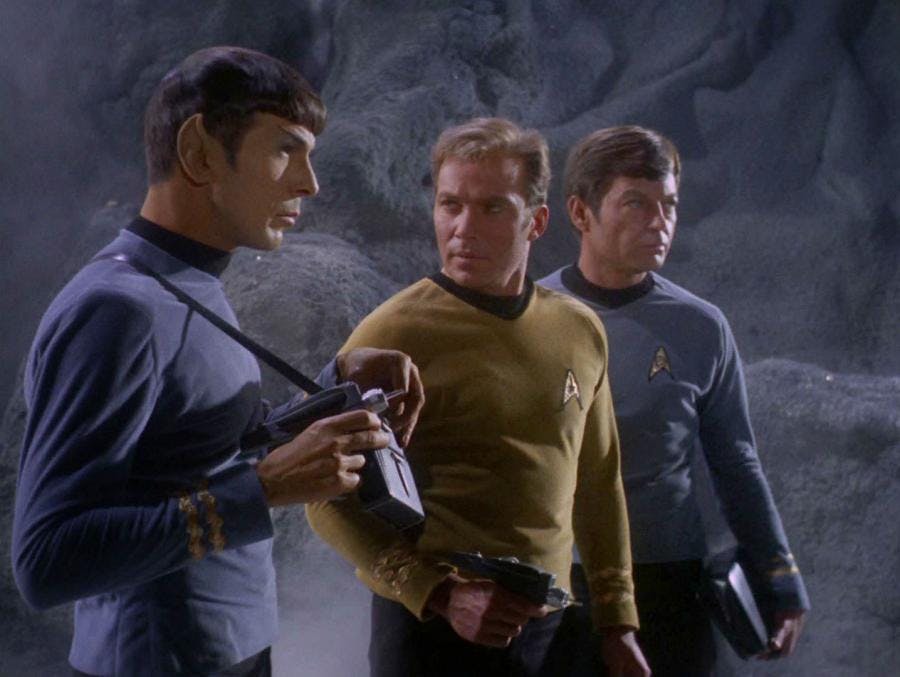Published Oct 30, 2013
STARLOGGING WITH DAVID MCDONNELL: What Are Robert Blochs Made Of?
STARLOGGING WITH DAVID MCDONNELL: What Are Robert Blochs Made Of?


Have I shocked you? Probably not. I'm just alluding to Bloch's oft-repeated bon mot (or as he might pun it, Bloch mot). He was a man of great wit, a noted writer, a sweet guy. And, also, author of Psycho.
He really had a remarkable career. Let me put it in context. Bloch (who died in 1994) began in the 1930s as a young fan writing letters (published in Weird Tales, the seminal horror & fantasy magazine) which daringly lambasted Robert E. Howard's ultra-popular (and then brand-new) Conan the Barbarian adventures, causing other readers to pillory him. Soon, he was a pro writer himself, making his 1934 debut in Weird Tales and exchanging correspondence with horror icon (and WT mainstay) H.P. Lovecraft. Bloch asked him for permission (quickly granted) to kill off a Lovecraft-like character in his story "The Shambler from the Stars" and Lovecraft returned the ghoulish "favor" in "The Haunter of the Dark," dispatching a Bloch figure with Cthulhuian glee.
Bloch wrote for the next six decades: 400+ short stories (including the much-anthologized "Yours Truly, Jack the Ripper" and the Hugo-winning SF tale "That Hell-Bound Train"), mystery novels (The Scarf, The Star Stalker, Firebug), screenplays (Strait-Jacket, The Night Walker, The Cabinet of Dr. Caligari) and, of course, Psycho. That 1959 book was inspired by real-life crazie Ed Gein's murders in rural Wisconsin (although Bloch and the world at large didn't then know the full, bizarre details) and, as two old friends of mine (Starlog film historian Tom Weaver, mystery expert Chris Steinbrunner) have reported, the dysfunctional (but not so extreme) relationship between genre superfan/Castle of Frankenstein Publisher Calvin T. Beck and his mother. With its most shocking moments taken directly from Bloch's book, it was memorably filmed in black & white by Alfred Hitchcock in 1959-60 (the screenplay adaptation was by Joseph Stefano, who later co-wrote The Next Generation's "Skin of Evil," which, SPOILER ALERT, offed Tasha Yar). Anthony Perkins starred as troubled Norman Bates (and was forever typecast).
Then, Star Trek called. Like established genre authors Richard Matheson, Theodore Sturgeon, Jerry Sohl and Harlan Ellison, Bloch had already written for television (Alfred Hitchcock Presents, natch). The five of them did much to bring a different sense of wonder to Trek. Bloch, in particular, wrote three great episodes: "What Are Little Girls Made Of?", "Catspaw" (intended by the producers as a Halloween offering) and, my favorite of his trio, the Jack the Ripper-themed "Wolf in the Fold."

"That was their suggestion," Bloch told Starlog's Randy & Jean-Marc Lofficier in 1986 (issue #113). "They wanted me to do a Jack the Ripper story in the future. So, I said, 'All right, let's put him into a computer or something instead of having him skulking around with a knife on shipboard.' There were a number of changes made to that script because I knew very little about computers. I still do." By the way, when Gene Roddenberry got his star on the Hollywood Walk of Fame (the first TV writer so honored), Bloch was there; he sat with the Lofficiers at the luncheon which followed.
I've read many (though not all) of Bloch's major works. His short tales are pure delights with stylish wordplay, unusual plots and twisty, trademark "Bloch endings." He adapted a number of those stories for radio dramas, TV anthologies (Thriller, Night Gallery, Tales from the Darkside) and multi-part movies (Torture Garden, The House That Dripped Blood, Asylum). I especially liked his novels NightWorld, American Gothic (which fictionalized the crimes of Herman Mudgett a.k.a. H.H. Holmes, America's first infamous mass murderer, during the 1893 Chicago World's Fair) and, naturally, The Night of the Ripper (with its predictably unpredictable twists). If you like thrills and chills, I recommend Bloch. Amazon is just a click away.
As a Bloch buff, I was delighted when Jim Steranko (Editor/Publisher of Mediascene Prevue, the magazine where I initially worked) interviewed the author in his California home during a 1982 sojourn there. I transcribed their talk and ghosted its italicized intro (using the "heart of a small boy" line again).
In that Prevue #49 piece, Bloch addressed the Psycho-logical effects on his career and why he waited almost 25 years to write a sequel. You see, he had sold absolutely all film rights (including potential sequels) with the first book for $9,500 (shared with publisher and agent). If Bloch did a follow-up novel, Universal Pictures would automatically own its movie rights, too--- for free. Finally, his savvy agent Kirby McCauley landed Bloch such a big payday for a sequel (and accompanying reissue of the original book) that the contractual gift to the studio didn't seem so ludicrous. (Think about it! He made less money from Psycho's film rights than doing those three Trek scripts!)

That 1983 movie was followed by a 1986 sequel flick (Psycho III, directed by star Perkins), a 1990 telefilm (Psycho IV: The Beginning, also with Perkins) and the ill-conceived 1998 color remake Psycho (starring Vince Vaughn as Bates). With no Norman on hand, even the locations got into the act! In Bates Motel, a 1987 TV movie/unsold series pilot, a former looney bin pal (Bud Cort) inherits the business whereas in yet a third Psycho novel by Bloch, 1990's Bates House, both motel and mansion are rebuilt as a creepy tourist attraction, complete with audioanimatronic Norman Bates. Currently, Freddie Highmore stars on TV as Young Norman in A&E's prequel cable series a.k.a. Bates Motel. There's even a non-fiction book (by Cinefantastique's Stephen Rebello) which, in turn, spawned Hitchcock, the 2012 movie about the making of the (original) movie, with Anthony Hopkins as Hitch.
Too much Psycho-babble? Let's get back to Starlog stuff. Armed with Bloch's address and phone number (courtesy Steranko), I recruited him for Starlog's fall 1984 100-page special issue. From 1982-4, under Editor Howard Zimmerman, Starlog did three annual movie review editions on sale in October (#64, #76, #88; I worked on the latter two). Therein, notable SF writers (like Arthur C. Clarke, Norman Spinrad, regular columnist David Gerrold, Trek novelist A.C. Crispin, etc.) and assorted magazine staffers would review the year's major genre films.
And we assigned Bloch a movie that everyone at Starlog liked. We thought he would dig Gremlins; it was so Blochian in nature---blackly humorous, real thrills, cold chills, wacky monsters, a teensy bit of gore. But, surprise twist! He didn't much like Gremlins, and his review manuscript not only got the plot slightly wrong (we corrected it) but boasted a batch of gremlins itself (typos). Editors fix this stuff in all writers' copy (including mine), so no big deal. It's just that as a youngish author-worshipping Bloch fanboy, I didn't expect any such SNAFUs in his Starlog #88 prose. He was Robert Bloch!
A sidenote twist: With me now as Editor, we temporarily abandoned the SF pros review flicks format for the next three years. Instead, Starlog #100 in 1985, our "centenary," honored "The 100 Most Important People in SF & Fantasy" (including Bloch, Roddenberry, Clarke, Matheson, Sturgeon and Ellison). Issue #112, a 1986 bestseller, celebrated Star Trek's 20th Anniversary while #124 showcased the 1987 premiere of Star Trek: The Next Generation. That "temporary" review hiatus became permanent; we never returned to the idea.
Meanwhile, I was in Los Angeles with a Starlog Festival looming. I called Bloch up to see if he might be a last-minute, surprise con guest, but he couldn't make it. Drat! I had wanted to meet Bloch in person. You know, just to see what he was like. As he humorously told Steranko, "I'm not the monster my work seems to indicate. It disappoints everybody. Whenever I try to do something about it, my wife restrains me."
Fortunately, I had a second chance at another convention. It was no disappointment. Bloch was Toastmaster there, flourishing a cigarette holder like a man from another time while simultaneously brandishing his rapier wit. He autographed some books for me, but the most fun was just skulking around with this legend who had been--- if only for one lonely Starlog movie review--- one of "my" writers. Just as I had always been one of his fans.
________________
David McDonnell, "the maitre’d of the science fiction universe," has dished up coverage of pop culture for more than three decades. Beginning his professional career in 1975 with the weekly "Media Report" news column in The Comic Buyers’ Guide, he joined Jim Steranko’s Mediascene Prevue in 1980. After 31 months as Starlog’s Managing Editor (beginning in October 1982), he became that pioneering SF magazine’s longtime Editor (1985-2009). He also served as Editor of its sister publications Comics Scene, Fangoria and Fantasy Worlds. At the same time, he edited numerous licensed movie one-shots (Star Trek and James Bond films, Aliens, Willow, etc.) and three ongoing official magazine series devoted to Trek TV sagas (TheNext Generation, Deep Space Nine, Voyager). He apparently still holds this galaxy’s record for editing more magazine pieces about Star Trek in total than any other individual, human or alien.
Copyright 2013 David McDonnell

